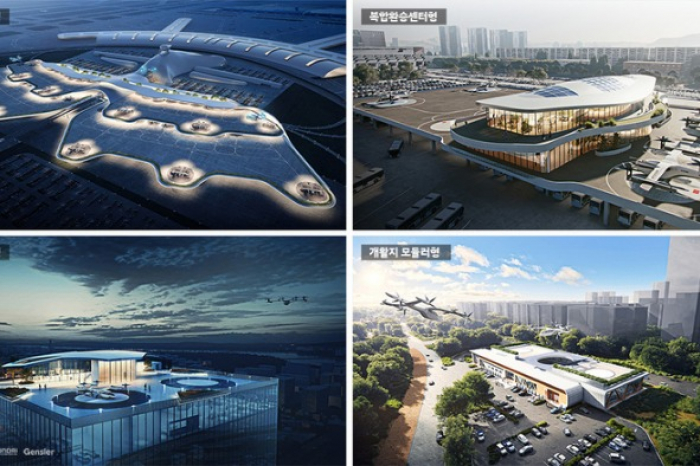Future mobility
Hyundai E&C unveils 1st designs for Korean-made UAM vertiports
The construction giant proposes four types considering operating efficiency and location
By Nov 11, 2022 (Gmt+09:00)
1
Min read
Most Read
LG Chem to sell water filter business to Glenwood PE for $692 million


KT&G eyes overseas M&A after rejecting activist fund's offer


Mirae Asset to be named Korea Post’s core real estate fund operator


StockX in merger talks with Naver’s online reseller Kream


Meritz backs half of ex-manager’s $210 mn hedge fund



South Korea's Hyundai Construction and Engineering (E&C) has unveiled for the first time its concept designs for the urban air mobility (UAM) infrastructure UAM vertiport.
The company on Thursday said it presented its designs at the 2022 K-UAM Confex held at Paradise City Hotel on Incheon's Yeongjong Island that runs from Thursday through Saturday. Hyundai E&C is a member of the K-UAM One Team Consortium along with Hyundai Motor, Incheon International Airport Corp. (IIAC), KT and Korean Air.
A vertical takeoff and landing spot, the vertiport is a key component in the development of the UAM ecosystem along with aircraft and traffic management. Hyundai E&C said its designs feature a range of business models applicable in Korea to expand UAM infrastructure operations.
The vertiport designs were developed with the San Francisco-based Gensler, a global airport design company that worked on the Incheon airport's Terminal 2, John F. Kennedy International Airport in New York and Changi Airport in Singapore, and IIAC, which possesses the world's highest level of know-how in airport operations.
Considering operating efficiency and locational traits, Hyundai E&C designed four types of Korean-style urban vertiports: airport linked, building top, complex transfer center and open land modular. The designs cover existing infrastructure at airport terminals, roofs of downtown buildings, tops of bus terminals, riverside and wide-open terrain.
In November last year, Hyundai E&C formed the consortium and signed a business agreement on the successful launch of the UAM industry and creation of a related ecosystem.
In May this year, it jointly submitted a proposal to take part in Phase 1 of the 'K-UAM Grand Challenge,' a national verification project to prepare for commercial UAM service starting in 2025. For the event, the consortium will open a joint exhibition hall to promote key activities related to the project.
Write to Eun-Ji Shim at summit@hankyung.com
More to Read
-
 Future mobilityHyundai opens world's first UAM takeoff, landing area in UK
Future mobilityHyundai opens world's first UAM takeoff, landing area in UKApr 27, 2022 (Gmt+09:00)
1 Min read -

-
 Future mobilityLotte joins Korea’s UAM race as Hyundai closes ranks with others
Future mobilityLotte joins Korea’s UAM race as Hyundai closes ranks with othersNov 16, 2021 (Gmt+09:00)
3 Min read
Comment 0
LOG IN


